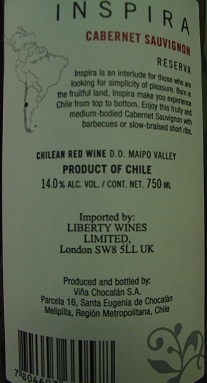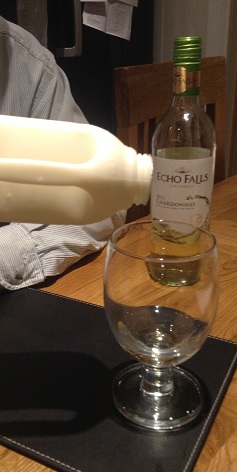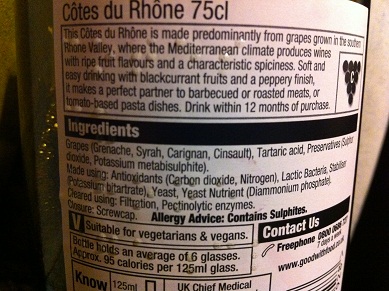Most wine contains some sulphites, and when you examine any wine bottle label you’ll see it clearly indicated; contains Sulphites! Wine manufacturers now have to declare any allergens used as ingredients, including sulphites as the main additive.
It’s used as a preservative or anti-oxidant to make the wine last longer, but for those with a sulphite allergy it can cause very serious anaphylactic attacks. There is no way to tell from the label whether a wine is high or low in sulphites so those with a serious allergy need to steer clear.
Some wine gives me a very bad skin reaction. I do know that I’m much better if I drink vegan, organic or bio-diverse wines which are made in a more traditional way and are more likely to be far more naturally produced.
They cost a bit more but I’ve never suffered a reaction after drinking these types of wines. Local wine in Europe drank in restaurants also seems to give me less trouble than wine bought in pubs and supermarkets here in England. Are we sent the dregs to drink over here? All this has put me off drinking wine rather, as you can’t demand organic wine at a friends house and hardly any pubs stock vegan, dairy free or sulphite free wines. On the odd occasion I have asked I’ve been met with a very confused stare so it’s best to drink something else; vodka and tonic for me please!
So when I saw this wine in my local wine shop I was puzzled (see picture). Does this mean that the Inspira Chilean cabernet sauvignon wine is either very low in sulphites, or contains none? Can you get wine with no sulphites? I have been told that organic wine doesn’t contain sulphites but haven’t been able to corroborate that with a professional or expert.
On my travels across the internet air waves I was delighted to discover this article on the Foods Matter website entitled “Sulphite free and low sulphite wines” which includes some interesting information about why wine contains sulphites, and also where to buy sulphite free and low sulphite wines. It seems they are very hard to come by but are available online; my local wine shop also said they hoped to be able to source some for me so I patiently await a phone.
I am happy to report however, that I drank a few glasses of this wine with no ill effects, so maybe the label is indeed correct. I just have expensive tastes – no cheap nasty sulphite packed wine for me!
Do you have a sulphite allergy? Have you tried low sulphite of sulphite free wines? Do you get side effects from drinking just one glass of certain or all wines? Would you recommend any sulphite free wines?













Hi Ruth – I have been meaning to pick up on this one again for a while as I have a bottle (empty sadly) of Sainsbury’s ‘no sulphur added’ South African Cabernet Sauvignon on my desk which I was brought as a gift but which I was told was no more expensive than a ‘normal’ wine- which, if you went by the article on our site seemed rather unlikely….
Now that the awards and the Allergy show are all finally over I will check it out and let you know….
My suspicion is that ‘no sulphur added’ is not the same as sulphite free…
Yes I wonder what that means. Wouldn’t it be nice to see the percentage of sulphites contained? Other foods have to provide this kind of detail so why not alcoholic beverages too? I’ve heard that wine can contain milk, fish etc. too but you hardly ever see that on labels so how true is that? and would it be enough to cause someone with an allergy an adverse reaction? PS. Shame that bottle on your desk is empty!
Most of no sulphur added wines will have naturally occurring sulphites in minimal concentration, usually below 10-20 mg/l so very low and undetectable.
Hi Ruth.
I believe I’m able to answer some of your questions here. Firstly we specialise in sulphite free wines so your readers can buy them online from our website. We also have some very useful info – we are the website the Foods Matter article links to. The Chilean wine pictured will contain sulphites – it is simply a labelling mistake (a very serious one!). We are in the process of importing Chile’s first ever “no added sulphite” wine which is produced by Teillery Wines, so in theory this wine must contain them. I will report it to the FSA for investigation as this could be potentially fatal for somebody with a sulphite allergy. South American countries are notoriously lax with labelling, although the FSA does a good job of enforcing the rules wherever they’re alerted. EU certified “Organic” wines still contain sulphites and plenty of other chemicals, as it is only the grape growing which is certified. Even biodynamic wines are permitted to contain up to 90 mg/l which is easily enough to give a sensitive person a fatal reaction. USA certified organic wines are not (currently) allowed to add sulphur, although unfortunately there is pressure to lift this rule! The subject is complicated and diverse so please go to our website for a full explanation of the subject. We feature wines which are completely natural with no chemicals whatsoever.
Hi John. Thank you so much for commenting. It’s great to finally hear from an expert. I will try out your wines soon. Madness here at present with walls and ceilings coming down so a celebration later in the year when all done will be called for. I understand it much better now. So do wines every contain dairy? and why would they ever need to?
Hi Ruth,
It has been confirmed that the Inspira wine pictured does indeed contain sulphites, and the labelling issue will need correcting before it is legally allowed to be sold in the UK. It is made by Chocalan Winery who produce about 1.5 million bottles a year, so the sulphite content is very likely to be too high for anybody with a sulphite allergy. Generally to create a wine low in sulphites, hand picking, small batch fermentation and very careful handling are required, which isn’t really viable on this scale at this price point. The winery has a good reputation and the wine is reputed to be pretty tasty though, for anybody who doesn’t react to sulphur.
Hi Ruth. Wine is “fined” before bottling – a substance is added which binds to unwanted particles, which then drops to the bottom of the tank where it can easily be removed. There is a myriad of different fining agents, some derived from dairy products, others from the swim bladder of a fish (sturgeon I believe), and others which are not derived from animals at all. Different producers use different fining agents. However, allergic people shouldn’t be concerned, as the quantities are miniscule and they are removed from the wine anyway of course. The EU has recently updated it’s labelling laws and doesn’t require these ingredients to be listed as they are effectively harmless in such tiny amounts. Vegans may object on moral grounds of course, so there are some wines which advertise themselves as vegan friendly, although you would need a vegan friendly producer or marketing person to advertise the fact.
Thanks John, that’s really interesting. I have seen one wine with “Contains Dairy” on the label, and having a dairy allergy I was concerned. Sounds like this kind of labelling isn’t necessary any more then. I think any reations I might be having to wine are to do with other unnatural chemicals or stuff that’s added to the wine making process, rather than dairy by the sounds of it. It is interesting though to think about what goes on in the process of making stuff that we don’t know about, just to make it look better, taste a certain way etc.
Hi,
There is sulphite and there is sulphite.
All wine contains sulphites, as do sauerkraut and other fermented food and drinks, but these are naturally occurring products (effects) of fermentation.
The key words really are “No sulphites *added*”, which means that the wine contains only the naturally occurring sulphites. Wine that does have sulphites added – in order to control the fermentation process and prevent unwanted bacterial growth, and, crucially, to normalise/standardize wine – has industrially produced sulphites added and that is almost all wine.
In France, I am told, there is about 1% of wine producers who do not add sulphites – and eight of them live in the region where I do. Just been to see one of them today, which is how I ended here, because we spoke of the emerging market and the difficulties that producers face.
It is difficult because sulphites help produce uniform wines (without added sulphites there is noticably more fruity taste left – you can taste the grapes much more) and that’s what people (think) they want: something predictable. Additionally, it is a way to (shoot sparrows with canons and) make sure that entire badges do not go all bad with undesirable bacterial growth, but of course it in turn becomes a chemical cocktail. So:
sulphites = risk reduction + uniformity
That’s the story I get from the “no added sulphite” wine producers here in Ardeche.
We can arrange tours to the vineyards and also hook you up at a distance, if you want to buy before tasting
This: “make sure that entire badges”
.. should of course read: make sure that entire *batches*